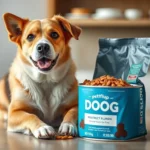
Proper nutrition is crucial for maintaining the health and well-being of our furry friends. As pet owners, understanding what constitutes a balanced diet for dogs can significantly impact their overall quality of life. One common question that arises in dog nutrition discussions is regarding the safety and suitability of various human foods, particularly fruits. Among these, apple juice often comes up, prompting the question: can dogs drink apple juice?
This article aims to demystify the relationship between dogs and apple juice, exploring its nutritional profile, potential risks, and how it fits into a dog’s diet. By the end, you will be equipped with the knowledge to make informed decisions about adding apple juice to your dog’s diet and ensuring their nutritional needs are met.
Understanding Dog Nutrition
Importance of Proper Nutrition
Nutrition is fundamental to a dog’s health. Just like humans, dogs require a balanced diet that provides them with the essential nutrients necessary for growth, development, and overall vitality. Proper nutrition impacts energy levels, immune function, skin and coat health, and even mood.
The essential nutrients for dogs include:
- Proteins: Vital for growth and repair of tissues.
- Fats: Important for energy and cell structure.
- Carbohydrates: Provide a quick energy source.
- Vitamins and Minerals: Support various bodily functions, such as bone health and immune response.
Common Nutritional Needs by Dog Size and Age
Nutritional requirements can vary significantly depending on a dog’s size and age. Here’s a quick overview:
- Puppies: Require a diet rich in proteins and fats to support their rapid growth and energy needs.
- Adult Dogs: Need a balanced diet that maintains their health and prevents obesity.
- Senior Dogs: Often require lower calorie diets but may need higher fiber to aid digestion.
Additionally, the dog’s size plays a crucial role in determining dietary needs:
- Small Breeds: Generally have higher metabolism and may need more frequent meals.
- Medium Breeds: Require a balanced diet to maintain their weight.
- Large Breeds: Need diets that support joint health and prevent rapid growth to avoid skeletal issues.
The Role of Fruits in a Dog’s Diet
Benefits of Feeding Fruits to Dogs
Fruits can be a nutritious addition to a dog’s diet. They provide essential vitamins, minerals, and antioxidants, contributing to overall health. For example, fruits like apples, bananas, and blueberries contain:
- Vitamin C: Helps with immune function.
- Fiber: Aids in digestion.
- Antioxidants: Protect cells from damage.
Potential Risks of Feeding Fruits to Dogs
While many fruits are safe for dogs, some can pose health risks. Certain fruits, such as grapes and cherries, are toxic to dogs and should be avoided entirely. Additionally, some dogs may have allergies or digestive issues with specific fruits.
Moderation is key when introducing fruits into a dog’s diet. Too much fruit can lead to gastrointestinal upset or obesity due to high sugar content.
Apple Juice and Dogs
Nutritional Profile of Apple Juice
Apple juice is known for its refreshing taste and is a popular beverage among humans. It contains vitamins such as Vitamin C and several antioxidants. However, it’s essential to understand how apple juice compares to whole apples:
- Whole Apples: Provide fiber and lower sugar content.
- Apple Juice: Often contains concentrated sugars and lacks fiber, which can lead to rapid spikes in blood sugar levels.
Can Dogs Drink Apple Juice?
The question remains: can dogs drink apple juice? The short answer is yes, but with caution. While plain, unsweetened apple juice can be safe in small amounts, many commercial varieties contain added sugars and preservatives that can be harmful to dogs. Thus, it’s crucial to choose natural, organic apple juice without additives.
Recommended Serving Sizes
If you decide to offer your dog apple juice, moderation is vital. A few tablespoons mixed into their food or given as a treat are generally acceptable. Always opt for homemade or 100% pure apple juice to avoid unnecessary additives.
For small dogs, start with a teaspoon and monitor for any adverse reactions. Larger dogs can have up to a tablespoon or two, but always observe their response to new foods.
Alternatives to Apple Juice
Healthy Hydration Options for Dogs
Water is the best hydration source for dogs, and it should always be their primary beverage. However, if you’re looking for alternatives, consider these dog-safe options:
- Watermelon Juice: Hydrating and low in calories.
- Cucumber Water: Refreshing and low in sugar.
Homemade Dog Treats with Apples
Instead of offering apple juice, consider making homemade dog treats using apples. Here’s a simple recipe:
Apple and Peanut Butter Dog Treats
Ingredients:
– 1 cup apple puree (unsweetened)
– 1/2 cup peanut butter (unsweetened, xylitol-free)
– 2 cups whole wheat flour (or oat flour for a gluten-free option)
– 1 egg
Instructions:
1. Preheat the oven to 350°F (175°C).
2. Mix the apple puree, peanut butter, and egg in a bowl.
3. Gradually add the flour until a dough forms.
4. Roll out the dough and cut into shapes.
5. Bake for 20-25 minutes or until golden brown.
This treat contains the benefits of apples without the risks associated with juice, providing a healthier option for your dog.
Signs of Adverse Reactions
Common Symptoms to Watch For
When introducing new foods, including apple juice, it’s essential to monitor your dog for any adverse reactions. Common symptoms may include:
- Vomiting
- Diarrhea
- Excessive gas
- Lethargy
If you notice any of these signs after giving your dog apple juice, discontinue use immediately.
When to Consult a Veterinarian
If your dog experiences severe symptoms, such as prolonged vomiting or diarrhea, or shows signs of distress, it’s crucial to consult a veterinarian. They can provide tailored advice and treatment based on your dog’s specific needs.
Conclusion
In summary, while dogs can have apple juice in moderation, it’s essential to choose pure, unsweetened varieties and to keep a close eye on your pet’s reactions. Understanding your dog’s nutritional needs and incorporating fruits safely into their diet can enhance their health and happiness. Remember, it’s always wise to consult with a veterinarian for personalized dietary advice tailored to your dog’s unique requirements.
FAQs About Dog Nutrition and Apple Juice
Can all dogs drink apple juice?
Not all dogs should consume apple juice, especially those with specific dietary restrictions or health conditions. Always consult your veterinarian before introducing new foods.
What should I do if my dog has an adverse reaction to apple juice?
If your dog shows signs of an adverse reaction, stop giving them apple juice immediately and monitor their symptoms. If symptoms persist or worsen, consult your veterinarian.
Are there any other fruits dogs should avoid?
Yes, dogs should avoid grapes, raisins, cherries, and citrus fruits, which can cause digestive upset or more severe health issues.
How can I incorporate more fruits into my dog’s diet safely?
You can safely incorporate fruits by offering small amounts of dog-safe fruits as treats, making homemade treats with fruit ingredients, or mixing pureed fruits into their food.
Understanding your dog’s nutritional needs and what fruits are safe for them is an essential part of being a responsible pet owner. With the right knowledge, you can ensure a balanced diet that keeps your canine companion healthy and happy.









